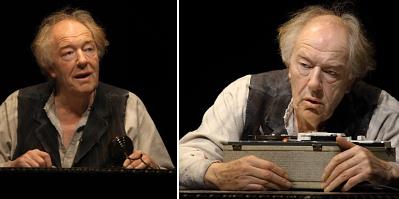Krapp's Last Tape
This is a one act monodrama by Samuel Beckett - most famous perhaps for his play 'Waiting for Godot'. 'Krapp's Last Tape' stars Sir Michael Gambon as Krapp who follows in the footsteps of notables such as Harold Pinter, John Hurt and Corin Redgrave who have all played the role. But the play was written for actor Patrick Magee, who tackled the play when first produced in 1958. The première was at the Royal Court Theatre, and acted as a kind of curtain raiser for another of Beckett's plays, 'Endgame'.
Krapp is a writer, and the play is set appropriately in his study, or den as he calls it. Each year on his birthday, Krapp takes out a tape he has recorded on a previous birthday to examine his former self and to record a new tape about the direction his life is taking. In a sense it's self-examination or recollection by tape recorder.
The play starts with Krapp slumped in a chair at his desk. He appears asleep or at least is motionless, and this state lasts for what seems like an eternity. Slowly, he starts moving, stretching his arms in the air and wiggling his fingers almost like an old insect trying to pump blood into aged wings. His fingers move over his face as if trying to discover if all the bits are still in the right places, and perhaps even deciding whether he's still actually alive.
Beckett described Krapp as 'wearish' and Michael Gambon's version is certainly that. He's dressed in an old white shirt with tail hanging out of stained trousers, with an old waistcoat that harks back to better and perhaps, more prosperous times. His wispy grey hair is dishevelled and long overdue for a trim, and his dirty white shoes add to the fact that in past times, Krapp may have been a snappier dresser.
In Beckett's script, there's detailed business involving bananas. Krapp has a passion for the fruit and finds two in his desk drawers. Michael Gambon and director Michael Colgan have decided to part from Beckett's description and make the bananas work differently. So, there's no tripping on the banana skin as Beckett defines. Rather, Gambon deliberately strides over it as if to say 'I'd not so stupid'. And there's a further banana joke, which really wasn't worth the effort.
There can't be many sets quite as simple as this. Just an old desk and a swivel chair adorn the stage, with a single light above. The desk drawers point out towards the audience, and its from these that Krapp finds his bananas and tapes. The tape recorder has a lovely old microphone which reminds one of vintage radio studios. So what does Michael Gambon make of the part? The answer really is that the characterisation lies in actions. There's not a huge amount of script for the 'live' Krapp to speak, so much of what we discover about him has to derive from mannerisms and gestures. I loved the way he runs his nail down the beaded edge of the desk, and the way he meticulously lines up items such as the recorder and tape boxes on the desk This speaks volumes about obsessional behaviour without a word being uttered. And his gait and bursts of rage are also equally convincing and also rather moving. However, I was less impressed with Michael Gambon's Irish accent, even though he is Irish by birth. In fact, I couldn't quite decide if there was supposed to be a hint of an Irish accent there or not - but maybe that's how he chose to play it.
Short, at just about 50 minutes or so, the attraction of this production lies in both Gambon's portrayal and Beckett's writing, much of which is thought to be autobiographical. It's certainly not an inspiring piece because it's about a man, filled with regret and remorse, who is approaching the end of his life. But Michael Gambon's finely worked performance is enthralling. Well-worth seeing.
"Artfully pitched production."
Lyn Gardner for The Guardian
"What is so moving about both play and performance is the tenderness that lurks among the harsh humour and terrible loneliness.."
Charles Spencer for The Daily Telegraph
"A few raw moments notwithstanding, we don't really penetrate the depths of this eccentric piece's mingled moods."
Henry Hitchings for The Evening Standard
"A piercing performance."
Paul Taylor for The Independent
External links to full reviews from popular press
Guardian - Telegraph - Independent
Originally published on
